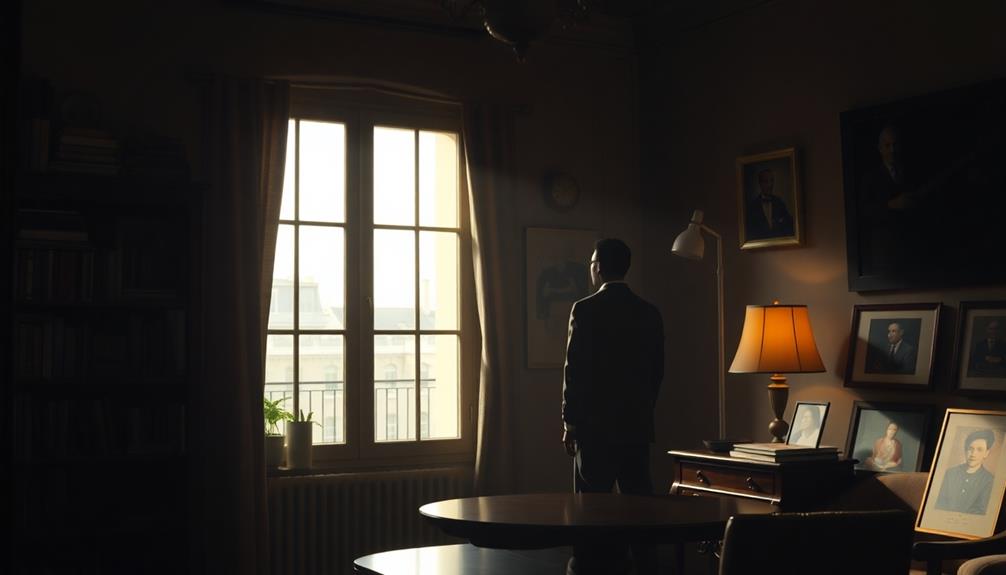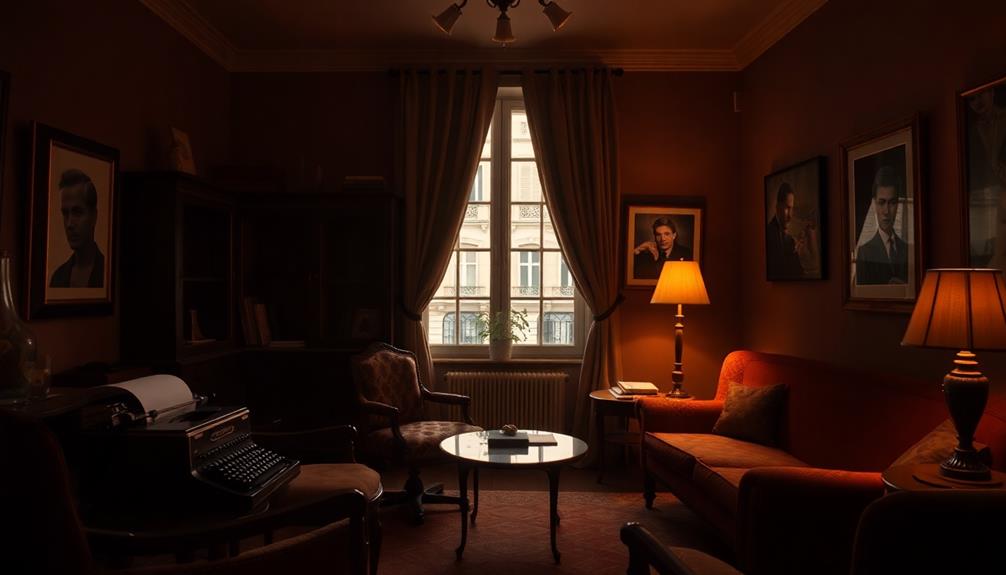In James Baldwin's *Giovanni's Room*, you'll explore David, an American expatriate in Paris, as he grapples with his bisexuality while torn between his love for Giovanni and his girlfriend, Hella. The story reveals deep emotional conflicts related to societal expectations and personal shame, culminating in tragedy as David abandons Giovanni amidst escalating tension. Characters embody the complex struggle for identity and acceptance within a prejudiced society. Baldwin's lyrical prose enhances the narrative's emotional weight, making it resonate even today. Keep going, and you'll uncover more about the themes and impact of this landmark LGBTQ novel.
Overview of the Plot
In *Giovanni's Room*, you follow David, an American expatriate in Paris, as he struggles with his bisexuality during an affair with Giovanni, an Italian bartender. While his girlfriend Hella is away in Spain, David grapples with his feelings for Giovanni, torn between his desire and societal expectations about sexual identity.
The novel, set in the 1950s, investigates themes of love, guilt, and the pressures that come with conforming to conventional norms. Baldwin's exploration of shame's roots in queer life adds depth to David's internal struggle, illustrating the emotional toll of societal constraints on personal identity.
As David navigates his relationship with Giovanni, his internal conflict intensifies. He experiences moments of profound connection with Giovanni, yet he feels the weight of his impending life with Hella.
The urgency of the narrative heightens as it unfolds on the night before Giovanni's execution, making David's choices even more consequential. Ultimately, David's decision to abandon Giovanni for a more socially acceptable relationship with Hella leads to heartbreak and tragedy.
Through David's journey, Baldwin explores the complexities of love and the pain that can arise from societal constraints. The story serves as a poignant reminder of the cost of denying one's true self in pursuit of acceptance.
Character Analysis
In "Giovanni's Room," you see David wrestling with his internal struggles around identity and love, which shape his relationships.
This conflict mirrors the experiences of other marginalized figures in history, such as Ida B. Wells and Giovanni's Room, who faced societal rejection and fought for their place in a world that often disregarded them.
Giovanni stands out as a figure of vulnerability, facing isolation and societal rejection that intensify his tragic journey.
Together, their complexities reveal the deep conflicts within the LGBTQ+ experience during that era.
David's Internal Struggles
David's internal struggles are shaped by the weight of his past, particularly the trauma of losing his mother and coping with his father's alcoholism. These experiences instill a deep sense of shame within him, complicating his journey toward self-acceptance.
His early sexual encounter with Joey ignites a conflict about his masculinity, compelling him to repress his homosexual impulses to fit societal norms. This repression breeds internalized homophobia, which clouds his feelings for Giovanni.
As you explore David's relationships, you witness his battle between the desire for authentic connection and the pressure to conform. With Hella, he tries to maintain a façade of normalcy, yet his heart pulls him toward Giovanni. This duality leaves him feeling trapped, unable to embrace who he truly is.
The climax of David's internal conflict arises when he confronts the repercussions of his choices, particularly regarding Giovanni's fate. This moment forces him to confront his guilt and shame, pushing him toward a deeper self-awareness.
Ultimately, David's journey highlights the painful complexities of traversing love, identity, and acceptance in a world that often demands conformity.
Giovanni's Vulnerability and Isolation
How does Giovanni's vulnerability shape his identity and relationships? Giovanni, an Italian bartender, embodies profound emotional depth that stems from his troubled past and societal rejection. His vulnerabilities create a complex web of isolation that affects his relationship with David, who struggles to embrace their love fully.
- Giovanni's flamboyant personality acts as both a shield and a source of vulnerability, making him enchanting yet alienating to those around him.
- The loss of his job and the realities of being an immigrant in Paris amplify his feelings of despair, leading him to seek acceptance in a world that often shuns him.
- The looming threat of his execution serves as a harrowing reminder of the consequences he faces for his identity and choices, deepening his isolation.
As David grapples with guilt over Giovanni's fate, he realizes that Giovanni's vulnerability underscores a broader quest for acceptance amidst societal rejection.
This dynamic ultimately highlights the fragility of human connection and the harsh realities that individuals like Giovanni endure in their search for love and belonging.
Exploration of Major Themes

Baldwin's 'Giovanni's Room' intricately weaves together major themes that resonate with the complexities of human experience. One of the foremost themes is social alienation, as you witness David's internal struggle with his bisexuality and Giovanni's status as an immigrant. Their experiences highlight the challenges of belonging in a prejudiced society, much like the systemic racism and identity struggles explored in Coates' work, particularly in the context of the Black experience in America the impact of systemic oppression.
This sense of alienation fuels David's identity crisis, as he grapples with his American expatriate status and societal expectations surrounding race and sexuality.
The novel critiques the perceptions that link whiteness with heterosexuality and blackness with homosexuality, showing how David's biases shape his view of others. Masculinity also plays a critical role, as David's insecurities complicate his relationships, revealing the influence of societal norms on emotional vulnerability and self-acceptance.
Additionally, the queer spaces of the gay bar and Giovanni's room serve as essential settings for queer expression. These spaces contrast sharply with David's rejection of his queerness, providing a sanctuary for Giovanni and other characters seeking acceptance.
Through these themes, Baldwin captures the struggles of love, identity, and belonging in a world that often denies both.
David's Internal Conflict
In "Giovanni's Room," you witness David grappling with his sexual identity while feeling the weight of societal expectations pressing down on him.
The absence of societal norms mirrors his internal struggle, as he faces the consequences of his desires and fears, reminiscent of the fragility of moral order seen in "Lord of the Flies."
His early experiences and the façade of his relationship with Hella only intensify his internal turmoil.
As you explore his conflict, you realize how deeply fear and shame shape his choices, ultimately leading to heart-wrenching consequences.
Struggle With Sexual Identity
Throughout *Giovanni's Room*, David's struggle with his sexual identity emerges as a complex and painful journey. His internalized homophobia complicates his attraction to Giovanni, even while he maintains a relationship with Hella. This conflict is shaped by various factors, including:
- Childhood experiences: Bullying another boy and the emotional fallout from his mother's death contribute to David's confusion about masculinity and sexuality.
- Societal expectations: The pressure to conform to traditional notions of heterosexuality leads him to feel ashamed of his true desires.
- Significant relationships: David's affair with Giovanni serves as a vital moment for self-exploration, but ultimately, he chooses a conventional life over embracing his bisexuality.
As David grapples with his feelings, he oscillates between yearning for authenticity and fearing societal judgment.
His ultimate decision to abandon Giovanni highlights the profound internal conflict he faces, reflecting the struggle many experience when reconciling their true selves with external pressures.
This poignant battle illustrates how deeply societal expectations can shape one's understanding of love and identity.
Effects of Societal Expectations
While David's attraction to Giovanni is genuine, societal expectations weigh heavily on him, creating a tumultuous internal conflict. He grapples with the rigid norms surrounding masculinity and heterosexuality, which dictate how he should feel and act.
His relationship with Hella becomes a benchmark for what society deems normal, pressuring David to conform to traditional roles despite his undeniable feelings for Giovanni. This clash forces him to confront his bisexuality, leading to profound guilt and shame for his desires.
Fearing societal rejection, David chooses to abandon Giovanni in favor of a conventional life with Hella, believing it will free him from the burdens of his true self. However, this decision only intensifies his emotional turmoil.
Baldwin vividly illustrates how these societal norms dictate David's narrative of love and desire, pushing him further into a state of alienation and regret. Each oscillation between his affection for Giovanni and the longing to meet expectations deepens his internal struggle, leaving him trapped in a cycle of shame.
Ultimately, David's conflict reveals the destructive power of societal expectations on personal identity and genuine connection.
Relationships and Consequences

Relationships in James Baldwin's 'Giovanni's Room' are fraught with complexity and consequence, shaping the characters' lives in profound ways. David finds himself at a crossroads, torn between the passionate connection he shares with Giovanni and the societal expectations embodied by Hella. This emotional turmoil drives David to make choices that ultimately impact not just his own life but those around him, reflecting the struggles of identity that many marginalized individuals face.
- David's friendship with Jacques complicates his feelings, introducing him to privilege and conflicting loyalties.
- The cohabitation with Giovanni intensifies David's internal struggle, as he grapples with his internalized homophobia and societal rejection.
- Hella's return forces David to confront his true desires, leading to a heartbreaking decision.
The murder of Guillaume serves as a stark reminder of the dangers faced by those living on society's margins, heightening the existing tensions among the characters.
David's eventual abandonment of Hella underscores his unresolved feelings for Giovanni, leaving him to face the painful consequences of his choices.
In the end, the relationships in this narrative reveal the deep emotional scars that emerge when authenticity clashes with societal acceptance.
Literary Style and Prose
Baldwin's lyrical prose in *Giovanni's Room* not only enhances the emotional weight of the characters' relationships but also deepens the exploration of their identities and struggles. His writing captivates you with rich imagery and emotional depth, allowing you to feel the intense love and despair that permeates the narrative.
By employing a first-person narrative style, Baldwin gives you an intimate glimpse into David's internal conflicts, making you acutely aware of his struggles with sexuality and societal expectations. This thematic complexity echoes the resilience showcased in Louis Zamperini's survival story, where personal challenges are intricately woven into the fabric of human experience.
The narrative structure invites introspection, weaving David's thoughts with his experiences in Paris. This psychological complexity draws you in, encouraging you to analyze the layers of meaning beneath the surface.
Symbolism plays a vital role, particularly in the depiction of Giovanni's room, which encapsulates David's emotional entrapment and longing for acceptance. Each element of Baldwin's prose serves as a vehicle for deeper understanding, inviting you to reflect on the intricate dynamics of identity and connection.
As you read, you'll discover that Baldwin's subtle moments resonate profoundly, making each revisit to the text an enriching experience. His mastery of language transforms personal struggles into universal themes, leaving a lasting impact on your understanding of human relationships.
Cultural Impact and Legacy

*Giovanni's Room* stands out as a landmark in LGBTQ literature, breaking new ground with its candid exploration of sexual identity and societal constraints. James Baldwin's work dives deep into the complexities of love and self-discovery, making it an essential piece for understanding the ongoing struggles within the LGBTQ community.
The themes of resilience and the courage to embrace one's identity echo the inspiring narratives found in authors' inspirational journey, highlighting the strength it takes to confront societal challenges.
Its cultural relevance persists through several key aspects:
- Influence on Writers: Baldwin's nuanced portrayal of bisexuality has inspired countless authors and activists advocating for LGBTQ rights.
- Academic Recognition: Initially met with mixed reviews, the novel has gained traction in academic settings, enriching discussions around race, sexuality, and identity.
- Continued Resonance: Modern audiences find Baldwin's themes of acceptance and self-discovery still pertinent today, reflecting the real-life challenges many face.
The legacy of *Giovanni's Room* is evident in its ability to foster conversation and understanding around sexual identity.
Baldwin not only created a significant narrative but also laid the groundwork for generations to explore these essential themes, proving that literature can spark change and promote acceptance.
Adaptations and Interpretations
Numerous adaptations and interpretations of *Giovanni's Room* showcase its lasting impact on culture and the arts. One notable adaptation is Neil Bartlett's BBC Radio 3 dramatization from 2010, which introduced Baldwin's poignant narrative to a new auditory audience. In 2024, a five-part reading aired on BBC Radio 4, further highlighting the novel's enduring relevance and appeal in contemporary culture.
These adaptations engage deeply with Baldwin's exploration of love, identity, and societal constraints, resonating with modern audiences. They also reflect ongoing conversations surrounding race and healthcare disparities, echoing themes found in works like *The Immortal Life of Henrietta Lacks* issues of race and healthcare disparities.
However, translating *Giovanni's Room* to film has faced financial challenges, reflecting the complexities of capturing Baldwin's nuanced themes on screen. Despite these hurdles, the novel's impact remains significant, with its inclusion in numerous academic discussions and literary courses, emphasizing its importance in LGBTQ literature.
As you explore these adaptations, you'll see how they not only honor Baldwin's original work but also reinterpret his messages for today's society. Each interpretation enriches the conversation around love, identity, and the human experience, ensuring that *Giovanni's Room* continues to inspire and provoke thought across generations.
Baldwin's Biographical Context

James Baldwin's upbringing in Harlem profoundly shaped his literary voice and themes. Growing up in a strict religious household, he faced racial discrimination and wrestled with his sexuality, which fueled his exploration of identity in his works.
In 1948, Baldwin moved to Paris, seeking refuge from American racial tensions and the freedom to express his true self.
Baldwin's experiences are intricately woven into *Giovanni's Room*, a novel that mirrors his life as a gay man maneuvering complex relationships. The following aspects of his life are essential to understanding his writing:
- His struggles with racial and sexual identity inform the emotional depth of his characters.
- The immigrant experience in Paris allowed Baldwin to reflect on his American identity from a new perspective.
- Baldwin's relationships, particularly with Lucien Happersberger, influenced the intimate portrayal of love and longing in his work.
Through Giovanni's Room Baldwin confronts the intersections of race, sexuality, and identity, cementing his role as a pivotal figure in both the civil rights movement and LGBTQ literature.
His journey inspires readers to grapple with their own complexities of identity.
Conclusion
In the end, James Baldwin's *Giovanni's Room* serves as a poignant exploration of identity, love, and societal expectations. As you reflect on David's struggles, you realize that the heart of the story resonates beyond its pages, challenging you to confront your own truths. Baldwin invites you to walk a mile in his characters' shoes, reminding you that understanding and acceptance often require facing uncomfortable realities. Ultimately, the novel remains a timeless tribute to the complexity of the human experience.



